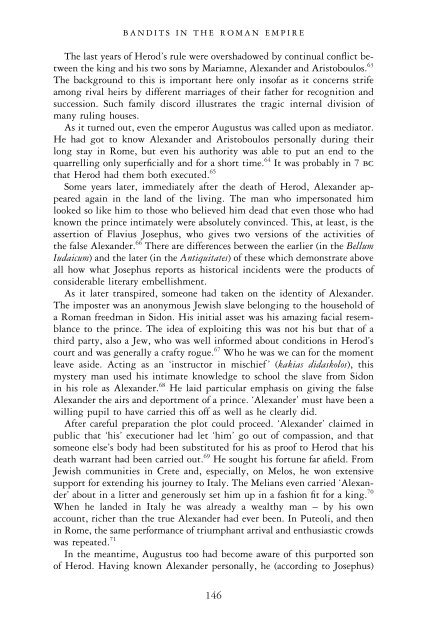You also want an ePaper? Increase the reach of your titles
YUMPU automatically turns print PDFs into web optimized ePapers that Google loves.
BANDITS IN THE ROMAN EMPIRE<br />
The last years of Herod’s rule were overshadowed by continual conflict between<br />
the king and his two sons by Mariamne, Alexander and Aristoboulos. 63<br />
The background to this is important here only insofar as it concerns strife<br />
among rival heirs by different marriages of their father for recognition and<br />
succession. Such family discord illustrates the tragic internal division of<br />
many ruling houses.<br />
As it turned out, even the emperor Augustus was called upon as mediator.<br />
He had got to know Alexander and Aristoboulos personally during their<br />
long stay in Rome, but even his authority was able to put an end to the<br />
quarrelling only superficially and for a short time. 64 It was probably in 7 bc<br />
that Herod had them both executed. 65<br />
Some years later, immediately after the death of Herod, Alexander appeared<br />
again in the land of the living. The man who impersonated him<br />
looked so like him to those who believed him dead that even those who had<br />
known the prince intimately were absolutely convinced. This, at least, is the<br />
assertion of Flavius Josephus, who gives two versions of the activities of<br />
the false Alexander. 66 There are differences between the earlier (in the Bellum<br />
Iudaicum) and the later (in the Antiquitates) of these which demonstrate above<br />
all how what Josephus reports as historical incidents were the products of<br />
considerable literary embellishment.<br />
As it later transpired, someone had taken on the identity of Alexander.<br />
The imposter was an anonymous Jewish slave belonging to the household of<br />
a Roman freedman in Sidon. His initial asset was his amazing facial resemblance<br />
to the prince. The idea of exploiting this was not his but that of a<br />
third party, also a Jew, who was well informed about conditions in Herod’s<br />
court and was generally a crafty rogue. 67 Who he was we can for the moment<br />
leave aside. Acting as an ‘instructor in mischief ’ (kakias didaskolos), this<br />
mystery man used his intimate knowledge to school the slave from Sidon<br />
in his role as Alexander. 68 He laid particular emphasis on giving the false<br />
Alexander the airs and deportment of a prince. ‘Alexander’ must have been a<br />
willing pupil to have carried this off as well as he clearly did.<br />
After careful preparation the plot could proceed. ‘Alexander’ claimed in<br />
public that ‘his’ executioner had let ‘him’ go out of compassion, and that<br />
someone else’s body had been substituted for his as proof to Herod that his<br />
death warrant had been carried out. 69 He sought his fortune far afield. From<br />
Jewish communities in Crete and, especially, on Melos, he won extensive<br />
support for extending his journey to Italy. The Melians even carried ‘Alexander’<br />
about in a litter and generously set him up in a fashion fit for a king. 70<br />
When he landed in Italy he was already a wealthy man – by his own<br />
account, richer than the true Alexander had ever been. In Puteoli, and then<br />
in Rome, the same performance of triumphant arrival and enthusiastic crowds<br />
was repeated. 71<br />
In the meantime, Augustus too had become aware of this purported son<br />
of Herod. Having known Alexander personally, he (according to Josephus)<br />
146


